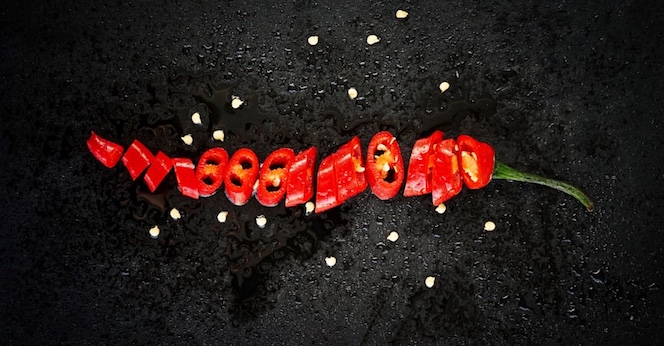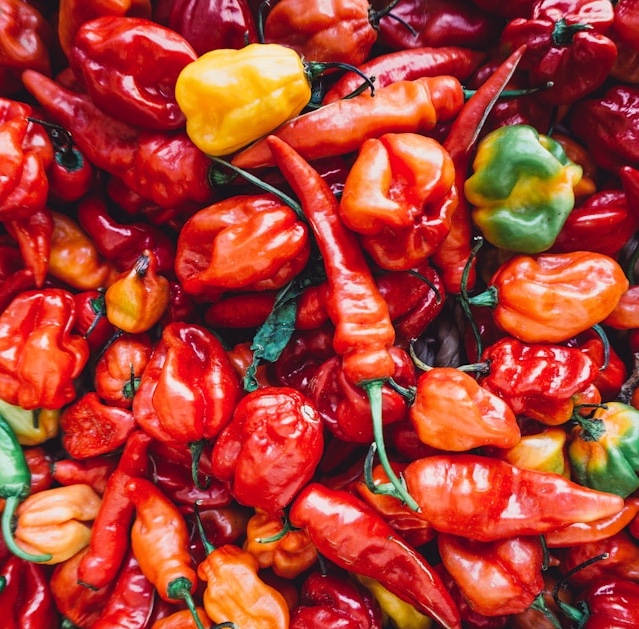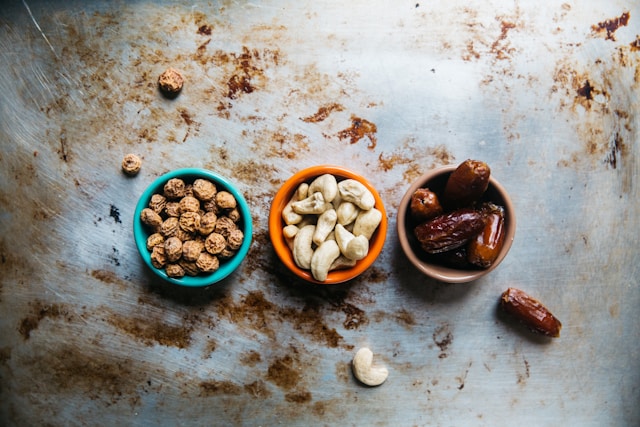Picture this: I finished Maghrib prayer, and after a long day's fast, I felt the excitement to dig into my first Ramadan Iftar with new friends. The smell of Biryani and grilled chicken flowed all through the Masjid. My mouth watered and I was ready to devour my own weight in food. But I discovered something about this food... it was spicy!
My first Ramadan I was a broke college student, so the idea of free Iftars at my masjid every day during Ramadan was very appealing. However, I quickly realized that these free meals had come with a price, they were SPICY! I would sit with my new brothers in Islam and eat spicy chicken and lamb until I couldn't take the burn in my mouth. To relieve my suffering, I devised a plan to switch between eating spicy food and then eating fruit salad to cool my mouth. However, when I ate the fruit salad my mouth would burn even more. After going back and forth between the spicy food and the fruit which was supposed to cool my mouth but only increased the burn, I looked to a newfound friend and explained my predicament. He laughed and said that the fruit salad had added spices.
Many of our brothers from the Masjid may not even notice just how spicy the food is because they've been eating it their entire life. But me? Nope, my family avoided spiciness and in my first Ramadan I was blindsided. Whether it's your first Ramadan or want to try at being the giga-chad of spice, a true pepper head, or maybe just enjoy eating some spicy Biryani at Iftar with your friends, here is the definitive guide to eating spicy food this Ramadan.
Tip 0 - Don't!
You read that right, don't eat spicy food if you can avoid it. Whether you're an experienced spicy king or just starting to learn the way of the spice, everyone can benefit from eating plain, spiceless food before a long night of Taraweeh. Spice can also lead to dehydration which will be compounded by the effects of fasting. In Ramadan, we should aim to not consume large amounts of food and avoid waste, so sticking to a small simple meal can be extra beneficial.
Ok... Ok... with that out of the way, here's the real definitive guide to eating spicy food this Ramadan.
Tip 1 - Chew Your Food Thoroughly
While this might seem obvious, it is one of the most important pieces of advice I ever received about eating spicy foods. While your mouth might feel as though you're chewing bits of lava, you need to hang in there and avoid the temptation to just swallow to get it out of your mouth. One of the leading causes of indigestion is incomplete chewed food and one study found a 13% increase in gastro discomfort for those that do not chew thoroughly.
Additionally, research from Iowa State University found that complete chewing led to less overeating, which is important when we're so hungry and don't want to overeat right before Tarawih.

Tip 2 - DON'T Drink Tons Of Milk OR Water.
When the burn starts, you might be tempted to douse your mouth with water as if putting out a forest fire. But it's important to avoid chasing spicy food with excessive amounts of water or milk. Many people tend to guzzle liquids while eating spicy food, which can lead to overeating. The worst part? You can easily drink too much before your body even realizes it's full.
Additionally, milk, especially for adults, can cause gastrointestinal discomfort, particularly in large quantities. So, even if you've seen countless guests on Sean Evans' Hot Ones talk show slurping down giant glasses of milk, just know they probably didn't feel great afterward.
The trick is to wait until the burn starts to fade away, and then drink, just a little. If you drink too soon, you'll likely just spread the capsaicin oil around your mouth and throat, intensifying the burn instead of soothing it.
Tip 3 - Avoid Oily/Greasy Food
Noticing a trend yet? These are actually just tips for eating healthy food that won't cause indigestion. But that's the thing people often misunderstand about spicy food.
All too often, people complain that spicy food upset their stomach, but if you ask, a little digging reveals the real culprit. They ate too much, then chugged water or milk to handle the heat, the food was greasy and oily, and they barely chewed their food. So now, all that oily, undigested food is sitting in their gut, wreaking havoc. Well, duh! That would upset anyone's stomach.
The truth is, when paired with healthy ingredients and eaten mindfully, spicy food is actually good for you, and your belly.
Tip 4 - Practice
For my second Ramadan I refused to go to another Iftar unprepared. This time, I had a plan, as a broke college student I went to the cheapest Indian restaurant on campus and started with level 2 out of 6 spiciness. After a week I worked my way up to level 3, then 4 and a few days before the month started, I was eating 5 out 6 spiciness. I didn't get all the way to max spiciness but it was time to test my tastebuds. And… my hard work paid off.
I wasn't an official pepper head slurping down the spice like it was nothing, I had a ways to go before I could eat raw habaneros just for fun, but that would come with lots more practice over the years.

Tip 5 - Find Your Flavor
Ramadan food comes with lots of different flavors. Finding the flavor that you like most will make it easier to gobble down spicy food. For me, I've always liked the flavor of habaneros, although I couldn't always handle the heat. But because I loved the flavor so much, I slowly started adding small amounts of chopped habaneros when I cooked. Slowly I began to add more and more habaneros until now I can eat a whole habanero in a single taco. Learning to find what you like, be it a type of pepper or a specific hot sauce, will make it more enjoyable to build up your spice tolerance.
Tip 6 - Know Your limits
Maybe you're like me, an American Muslim convert with little experience eating spicy food growing up. Who at one-point, vomited tabasco sauce out his mouth and nose because his friends dared him to drink just a single cap full of the sauce. Even if you gain spice tolerance it's still possible to overdo it by wolfing down too much.
Tip 7 - Eat Iftar with Friends
The best way to enjoy a spicy meal is in the company of friends and family. My first few Ramadans were unforgettable, not because of the food itself, but because every night, I broke my fast either at the Masjid's Iftar or as a guest in a friend's home. There's something deeply human about sharing a meal and making new connections in the process. It's an experience to cherish. So, if you haven't received an Iftar invite, check your local Masjid, or better yet, take the initiative! Invite some brothers or sisters over and cook for them. And now that you have this list, don't forget to add a little extra spice to keep things lively!
Lastly...
If you made it this far, thanks for reading. If you enjoy lighthearted news then follow us on Instagram.





